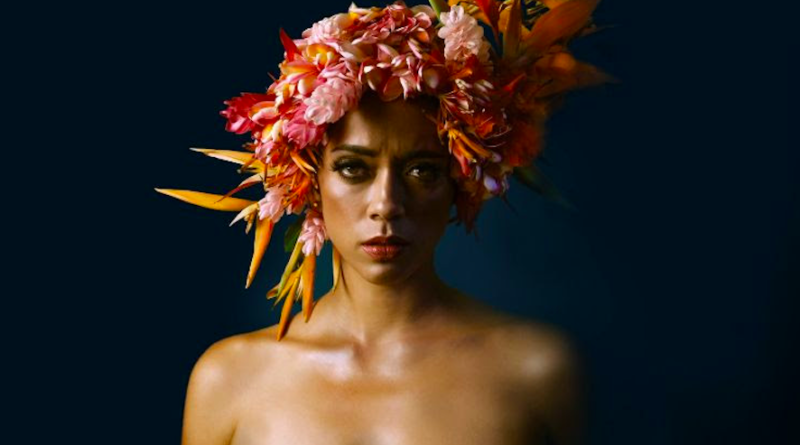INTERVIEW: Christopher Kahunahana on his new movie ‘Waikiki’
Photo: Danielle Zalopany stars as Kea in Christopher Kahunahana’s new film, Waikiki. Photo courtesy of filmmaker / Provided by Fusion Entertainment with permission.
Christopher Kahunahana’s feature film debut is called Waikiki, and it has won much praise on the festival circuit, including the Seattle International Film Festival, where it’s currently playing. The movie is centered on Kea (newcomer Danielle Zalopany), a character who is a part-time Hawaiian teacher, hula dancer and nightclub hostess. Her life takes a turn after she crashes her van into a homeless man in the middle of the night, according to press notes.
Waikiki is billed as an allegory for the contemporary issues facing Hawai’i’s people. Kahunahana said the character of Kea, and others in the narrative, are influenced by his own time as a nightclub owner in Honolulu.
“It initially started as a different screenplay,” the director said in a recent phone interview. “I had workshopped the screenplay through Sundance and the Writers’ Lab and such. It kept getting bigger and bigger, and it felt like it was getting farther and farther away from being produced because it just seemed like something that was unreachable. I had originally planned to shoot the film for as little as I possible could, and it felt like it was getting into the million-dollar range. I didn’t want to wait anymore, so I kind of cherry-picked a lot of the scenes and the main characters, and put them a couple weeks prior to where that screenplay starts. I thought I could shoot this thing on the weekends with friends and get it done.”
And that’s exactly what he did. He moved ahead with local actors and began filming the movie that would become today’s Waikiki. Each of the roles are based on his tenure in Chinatown, Honolulu, where he owned the nightclub Next Door for approximately a decade. “These are the people that I knew,” Kahunahana said. “That was the impetus, the kernel that kind of started the whole conversation of what I wanted to say about that time in my life and the people in our community.”
Kahunahana is a Kanaka Maoli filmmaker, and he wanted Waikiki to offer commentary on what has happened to the island community. All around him, he sees land not being properly utilized and other resources being used in an unsustainable manner. This inspired him to build a narrative around an authentic view of Hawai’i, and the dialogue is in both English and Ōlelo Hawai’i with English subtitles.
“For me, I know that a lot of the issues in our community stem from the fact that we are dislocated from our land,” he said. “As Kanaka Maoli, we feel the land is kupuna; it’s our elder. In some societies, a tree has no value until it’s cut down, but for us, a tree is our family. The land is our family, so when Hawaiians are dispossessed of the land, that disconnection to our culture and our history for me created a lot of this intergenerational trauma.”
Helping Kahunahana tell this story is Zalopany, who is making her feature-film debut alongside the director. Kahunahana said she is an amazing performer, and he found her by going to the theater, rather than typical talent agencies.
“I couldn’t find anyone that I thought was right for the role,” he conceded. “I needed somebody who had vulnerability, but strength, and I started thinking about where I could find a really talented actress. And I went to the community theaters actually, and I attended as many plays as I could. And I tried to see as many actresses or actors that I could, and Dani was in a play at that Kumu Kahua Theatre. … I saw a performance that she was in. I thought this person has the acting chops to do this role, so I approached her. At first, it was awkward. Some person is like, ‘Hey, you want to be in the film?’ She hadn’t done any film prior.”
After talking with her, Kahunahana knew she was the one. He was struck by her ability to express emotion through her performance, and other directors must now agree. Since Waikiki was shot in 2017 and 2018, she has performed in several short films. “She’s doing great things,” Kahunahana said. “I’m really excited for her.”
The actual filming process had some restrictions, mostly budgetary in nature, but with the restrictions came freedom as well. The principal photography took only 18 days, but because the actors live in the local community, they could revisit some scenes for additional footage if needed.
“We found a lot of things about this story that we thought we could improve on or add to the initial principal photography, and I think it made the film a lot better, gave it more dimension,” he said. “In Hawai’i, we have this term, kaona, hidden meaning or multiple meanings. It’s kind of metaphor, I guess would be a similar word, but in the editing process we realized that there’s these themes coming through that we could improve on. … I could say, ‘Hey, it’s 11:30 at night. Dani, I’m going to come get you right now.’ She says, ‘OK.’ And we just go into a stairwell and shoot a scene, so with the restrictions came a lot of freedom. I think it was people’s dedication to the film. Our intention was to do something good, and they were willing to work and get it done no matter what it took. So that kind of dedication to the project definitely shows on the screen, with the craft and the care and the love that went into making this project.”
By John Soltes / Publisher / John@HollywoodSoapbox.com
Waikiki, written and directed by Christopher Kahunahana, is now playing at film festivals, including the Seattle International Film Festival. Click here for more information.

